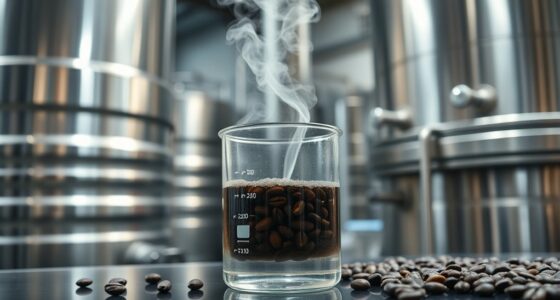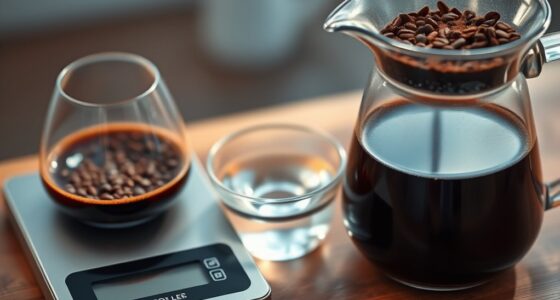Coffee doesn’t dehydrate you; it actually contributes to your daily hydration needs. While caffeine has a mild diuretic effect, regular coffee drinkers develop a tolerance, making it less significant over time. Moderate coffee intake levels, under 400 mg of caffeine per day, don’t lead to dehydration and may even enhance hydration. So, enjoy your cup without worry—it’s more beneficial than you might think. Want to learn more about how coffee fits into your hydration strategy?
Key Takeaways
- Moderate coffee consumption does not lead to dehydration and can contribute to overall hydration levels.
- Caffeine’s diuretic effects are minimal for regular coffee drinkers, who develop tolerance quickly.
- Coffee is 98% water, adding to daily fluid intake alongside its health benefits.
- Research shows urination patterns after coffee are similar to those after water or tea.
- Balance coffee intake with additional water to maintain optimal hydration levels.
Understanding Dehydration and Its Symptoms
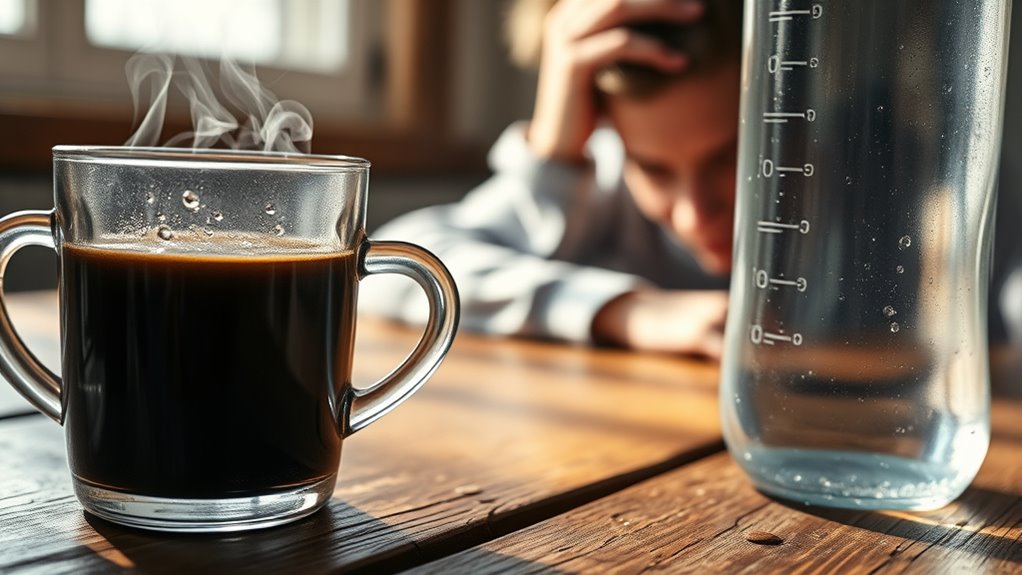
Dehydration happens when your body loses more fluids than it takes in, which can lead to serious health issues if not addressed.
To maintain fluid balance, it’s crucial to meet your daily water intake, roughly 2.7 liters for women and 3.7 liters for men.
Maintaining proper hydration is essential; aim for about 2.7 liters daily for women and 3.7 liters for men.
Watch for symptoms of dehydration, like intense thirst, reduced urination, and dark yellow urine. You might also experience dry skin and dizziness.
Severe dehydration can cause health complications, including kidney failure and confusion, requiring immediate medical attention.
Monitoring hydration is important; headaches, fatigue, and an increased heart rate may signal you need to drink more water.
Stay aware of these signs to keep your body functioning effectively and prevent serious issues.
The Science Behind Coffee’s Diuretic Effect
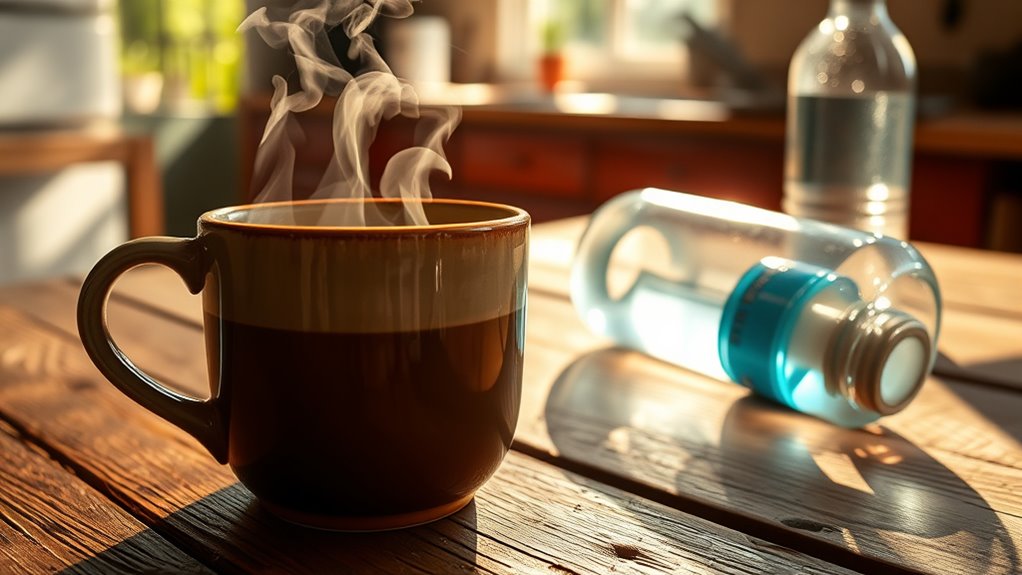
While many people worry that coffee might lead to dehydration, research shows that its diuretic effect is often overstated.
Here are some key points about coffee’s role in hydration:
- Caffeine acts as a mild diuretic, increasing urine production.
- Regular coffee drinkers develop tolerance to caffeine’s diuretic effects within 1 to 4 days.
- Moderate coffee intake (under 400 mg of caffeine per day) doesn’t greatly increase urine volume.
- Excessive caffeine (over 500 mg) is required for a noticeable diuretic effect.
- Coffee contributes to daily fluid intake, thanks to its high water content (about 98%).
Research Findings on Coffee and Hydration

When it comes to coffee and hydration, research shows some interesting findings.
Studies indicate that moderate coffee consumption doesn’t lead to dehydration and can actually contribute to your overall hydration levels.
You’ll see that regular coffee drinkers experience similar urination rates as those drinking water, highlighting coffee’s role in your daily fluid intake.
Caffeine and Diuretic Effects
Here’s what you need to know about coffee and hydration:
- Coffee is about 98% water, which helps counteract fluid loss.
- Regular coffee drinkers develop a tolerance to caffeine’s diuretic effects within days.
- Studies show coffee doesn’t markedly affect hydration levels in healthy adults.
- Urination patterns after coffee intake are similar to those after drinking water or tea.
- While coffee contributes to hydration, it shouldn’t be your only fluid source. Additionally, regular consumption of antioxidants that combat oxidative stress can further support overall health and hydration. Coffee contains bioactive compounds that may enhance its hydrating benefits when consumed regularly. Moreover, drinking lower-calorie versions of coffee-based beverages can help maintain hydration without excess sugar. Implementing data-driven decision-making can be beneficial for understanding and optimizing your overall hydration strategy.
- Coffee contains vitamins and minerals that may enhance its hydrating benefits when consumed regularly.
Hydration Index Studies
Many people wonder about the true impact of coffee on hydration, especially given its caffeine content.
Recent studies, including one from the American Journal of Clinical Nutrition, show that coffee can still contribute to hydration despite its diuretic properties. In fact, research indicates that regular coffee consumption results in body water levels comparable to those of water drinkers, with no significant changes in hydration status.
A 2014 review debunked the myth that caffeine leads to dehydration in healthy adults. While the hydration index studies revealed that coffee’s hydrating effects are weaker than those of beverages like beer and skim milk, experts agree that it can be part of a balanced hydration strategy, supporting overall hygiene and fluid retention.
Regular Coffee Consumption Benefits
Regular coffee drinkers can enjoy a range of benefits without worrying about hydration.
Research shows that moderate daily coffee intake, up to 400 mg of caffeine, has no significant adverse effects on hydration. In fact, coffee can be just as hydrating as water for habitual drinkers.
Here are some benefits you can expect:
- Maintains total body water levels
- Counteracts mild diuretic effects over time
- Contributes positively to overall fluid intake
- Guarantees caffeine intake doesn’t lead to dehydration
- Develops tolerance to caffeine’s diuretic properties
Recommendations for Safe Coffee Consumption
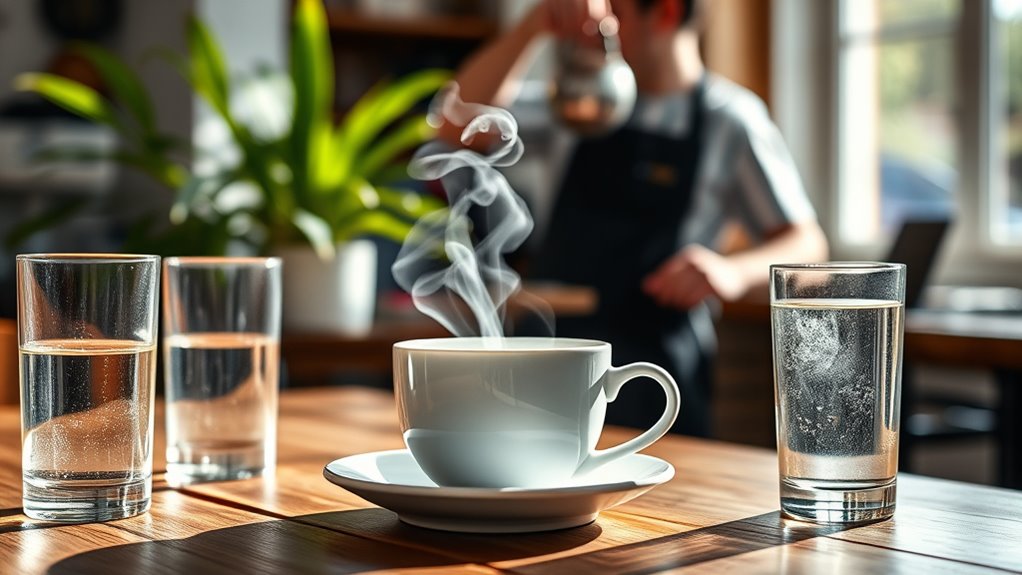
When it comes to enjoying your coffee, keeping daily caffeine limits in mind is essential for your health.
Make sure to balance your coffee intake with plenty of water and other non-caffeinated drinks to stay hydrated.
Also, be aware of your own caffeine tolerance, as it can vary from person to person.
Daily Caffeine Limits
Understanding daily caffeine limits is essential for safe coffee consumption. The FDA recommends a maximum of 400 milligrams of caffeine per day for healthy adults, which is about four 8-ounce cups of coffee. Pregnant individuals should limit caffeine to 200 milligrams, roughly two cups.
Here are some key points to weigh:
- Children under 2 should avoid caffeine entirely.
- Individual sensitivity to caffeine varies; monitor your intake.
- Drinking too much coffee can lead to high blood pressure and other health issues.
- The recommended amount for most adults balances the body’s daily fluid needs.
- Remember, coffee contains water, but it shouldn’t replace your water intake.
Stay informed to enjoy your coffee without compromising your health!
Balance With Water
To maintain ideal hydration while enjoying your coffee, it’s important to balance your intake with water throughout the day.
Aim to consume coffee in moderation—ideally not exceeding 400 milligrams of caffeine, or about four to five 8-ounce cups. This is especially important as some individuals may experience ear pressure due to dehydration and other factors. Additionally, be mindful that excessive caffeine consumption can lead to increased dehydration if not balanced properly. Regularly monitoring your air quality indicators can also help you maintain optimal hydration levels.
Alternating your coffee drinking with water can help prevent dehydration and keep your body hydrated. Consuming herbal teas alongside coffee can also provide additional hydration benefits.
Remember, coffee is about 95% water, so it contributes to your overall fluid intake.
If you’re sensitive to caffeine, consider switching to decaf or half-caf options.
Staying aware of your body’s response to caffeine is key. Additionally, maintaining proper air quality considerations can enhance your overall well-being while consuming coffee.
Individual Tolerance Awareness
Balancing your coffee consumption with water isn’t just about hydration; it’s also about recognizing your own tolerance to caffeine. Individual tolerance varies considerably, affecting how you respond to caffeine’s diuretic effects.
Here are some recommendations for safe coffee consumption:
- Know the FDA recommendations: Limit caffeine intake to 400 mg per day.
- If you’re a new coffee drinker, be cautious of your hydration needs.
- Monitor your water intake to counteract potential dehydration risk.
- Regular coffee drinkers often develop tolerance within 1 to 4 days.
- Adjust your caffeine consumption based on your body’s reactions.
- Understanding preventive care can help you make informed choices about your coffee intake and overall hydration.
Common Myths About Coffee and Dehydration
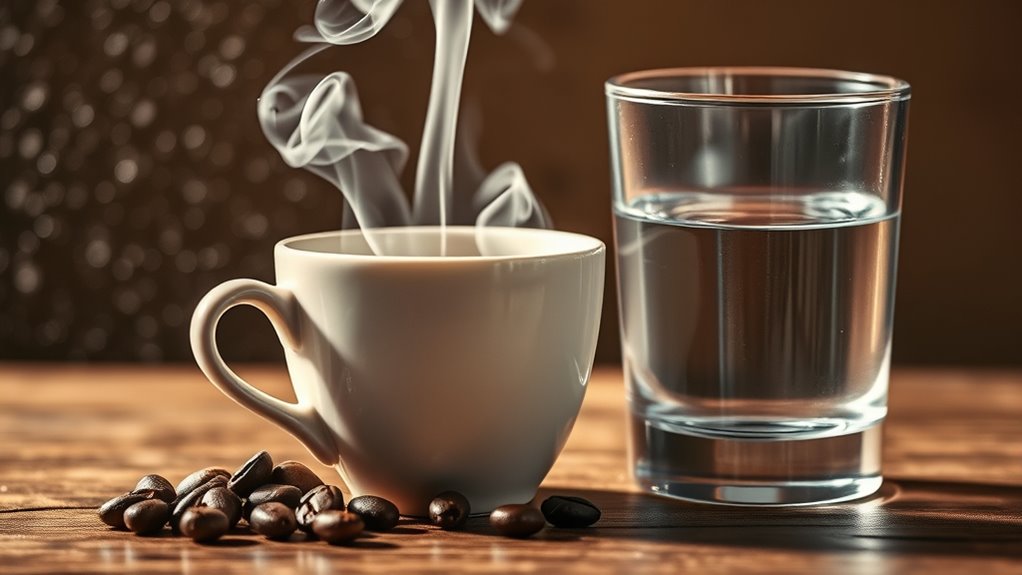
What if you’ve been misled about coffee and dehydration? Many believe that coffee dehydrates you, but this is a myth.
Research shows that the fluid content in coffee can actually offset its mild diuretic effects for regular coffee drinkers. Studies indicate that moderate coffee intake, which is about 400 mg of caffeine in coffee daily, doesn’t lead to significant dehydration in healthy adults.
It turns out that caffeine’s diuretic effect needs over 500 mg of caffeine—roughly five cups of coffee—to noticeably increase urine output. Newer findings, including those from the American Journal of Clinical Nutrition, confirm that coffee can contribute to overall hydration, debunking the notion that coffee dehydrates. Many sustainable coffee brands, such as Stumptown and Intelligentsia, emphasize the importance of ethical sourcing, which further supports the positive perception of coffee in our daily hydration habits.
The Role of Coffee in a Balanced Hydration Strategy
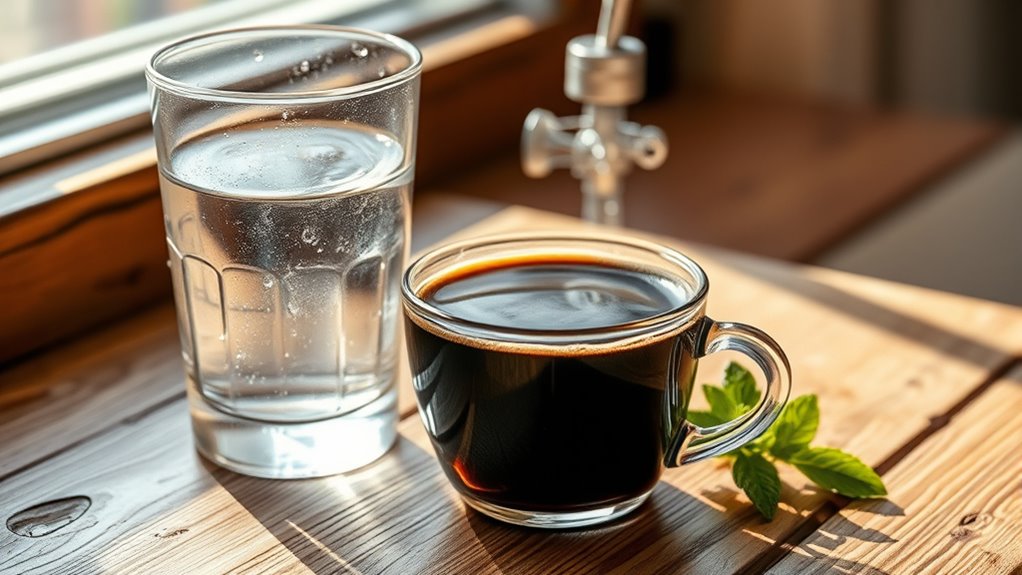
Misconceptions about coffee and dehydration can cloud our understanding of how it fits into our hydration needs. Drinking coffee every day can actually contribute to your daily fluid intake when consumed in moderation.
Misunderstandings about coffee and hydration persist, but daily coffee consumption can enhance your fluid intake when enjoyed in moderation.
Here’s how coffee plays a role in a balanced hydration strategy:
- It’s over 95% water, aiding hydration.
- Regular drinkers develop tolerance to caffeine’s diuretic effects.
- Moderate consumption (up to 400 mg caffeine) won’t dehydrate you.
- It provides antioxidants and B vitamins, enhancing health.
- Balance coffee with water and other hydrating beverages.
- Additionally, coffee’s caffeine absorption differs from cocoa’s, making it a more effective stimulant for hydration purposes.
Incorporating coffee into your routine can support hydration while delivering nutrients.
Just remember to enjoy it alongside plenty of water to maintain ideal hydration levels!
Frequently Asked Questions
Does Caffeine Actually Dehydrate You?
Caffeine doesn’t actually dehydrate you as many believe. While it’s a mild diuretic, your body adapts to regular caffeine consumption, reducing its water loss effects.
If you drink coffee regularly, you’ll find it can be just as hydrating as water. Most healthy adults can enjoy up to 400 milligrams of caffeine daily without worrying about dehydration, especially if you balance it with water intake.
Does Coffee Deplete Your Body of Water?
Like a gentle rain nourishing the earth, coffee won’t deplete your body of water. In fact, it contributes to your daily fluid intake.
While caffeine has a mild diuretic effect, it doesn’t cause dehydration in moderate coffee drinkers. If you enjoy your daily cup, you’re likely staying well-hydrated.
Just remember, balance is key—too much of anything can have its downsides, but a moderate coffee habit can be part of a healthy hydration strategy.
How to Stop Coffee From Dehydrating You?
To stop coffee from dehydrating you, drink water alongside your coffee.
Try alternating between the two to keep your hydration levels up. Limit your caffeine intake to under 400 milligrams a day, which is about four 8-ounce cups.
Incorporate water-rich foods like fruits and veggies into your diet, and pay attention to how your body reacts to caffeine.
If needed, opt for decaffeinated or half-caffeinated coffee to enjoy without the excess dehydration risk.
What Happens if You Only Drink Coffee and No Water?
Imagine relying solely on coffee for hydration. At first, it might seem fine, but soon you could face the consequences.
Without water, your body struggles, as caffeine acts as a diuretic, increasing urine production. You mightn’t realize it, but symptoms like dry mouth and fatigue could creep in.
Even though coffee’s mostly water, it can’t replace the essential fluids your body craves.
Conclusion
In the end, the truth about coffee and dehydration might surprise you. While it’s easy to assume that your favorite brew leaves you parched, research reveals a more nuanced story. As you sip that steaming cup, remember: it can be part of your hydration strategy, not the enemy. So, the next time you reach for your mug, consider how it fits into your overall fluid intake. Are you ready to rethink your relationship with coffee?


